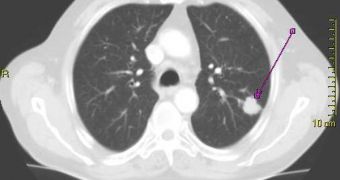Leading European experts have recently made it clear that fighting lung cancer, in all its forms, as well as preventing it, may be made a lot easier if physicians, surgeons, medical oncologists and radiation oncologists learned to cooperate a lot better and more efficiently share test results. Prevention programs and personalized therapies are also two of the factors that may significantly improve the outcome of this condition, which currently affects millions worldwide. Other than that, the potential of the onset of this disease is also extremely high in those who smoke, so establishing cooperative methods before the beginning of an epidemic may prove to be very useful.
“Lung cancer is a complex disease. It is one of the most complex cancers, and the more we learn about the biology of the disease, the more we realize that improved cancer care will result from multidisciplinary treatment,” Prof. Robert Pirker, an expert from the Medical University of Vienna, in Austria, explained. He is also the European Multidisciplinary Conference in Thoracic Oncology (EMCTO) scientific committee co-chair. The first edition of the meeting takes place between May 1st-3rd, in Luganoi, Switzerland, with the stated goal of furthering scientific and medical cooperation between all branches of medicine that are, at least vaguely, related to dealing with cancer.
“More sophisticated and complex treatments require more cooperation. That is one of the reasons why we have organized this conference. We believe the result will be better outcomes for lung cancer patients,” Pirker said. “Cure is now possible in about 15 to 20 percent of patients whose disease can be treated in this way,” oncology expert Prof. Jean-Paul Sculier, from the Institut Jules Bordet, in Brussels, Belgium, added. The expert is scheduled to chair an EMCTO session on treating advanced diseases, during the upcoming conference.
Over the years, fighting cancer has become much more of an art for physicians. Patients no longer benefit from the same standard treatment, but have their medication doses handed out to them depending on the molecular profile of their tumors. This type of personalized health care has considerably increased survivability chances in the last half a decade, especially for such a serious and life-threatening condition. Surgery and chemotherapy are currently joined by a number of other types of treatments, which ensure that at least some of those who are plagued by cancer can recover to some extent.

 14 DAY TRIAL //
14 DAY TRIAL //